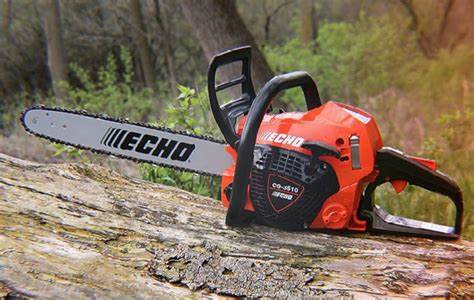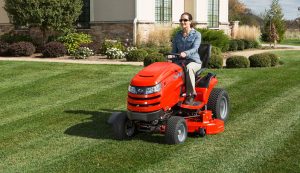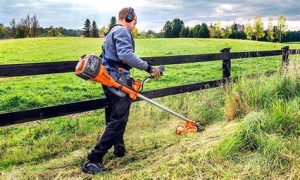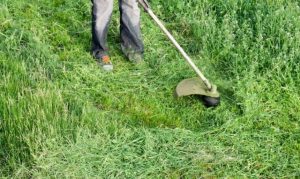8 Causes of a Smoking ECHO Chainsaw and How to Repair It!
You’re scared that something terrible is wrong with your chainsaw because it won’t stop smoking during use. If you’re using a saw and you see smoke, you should turn it off, investigate the reason of the smoke, and correct it before you do any more harm.
If your ECHO chainsaw is smoking, check for clogged air filters, too much oil in the fuel mixture, water in the fuel system, or an increase in bar and chain friction.
Smoking ECHO Chainsaw:
- improperly sharpened or dull chain
- Holes in the chain
- Chain-and-barrel oil tank that’s now empty
- Incorrect bar and chain oil
- Filter clogged with oil
- Air filter obstruction
- Adding too much oil to the gas tank
- There’s water in the gas tank.
Use extreme care when attempting to diagnose and fix problems with your chainsaw. Before attempting repairs, it is necessary to turn off the chainsaw, let the engine cool, and then remove the spark plug boot.
Table of Contents
ECHO Chainsaw Bar & Chain Smoke
Look for objects that can increase friction between the bar and chain if your ECHO chainsaw smokes during cutting.
A worn chain, one that isn’t properly lubricated, or one that gets stuck on the bar could cause this.
The ECHO Chainsaw’s Chain Is Either Dull or Wrongly Sharpened
The chain on your chainsaw will become dull and smokey if you use it to chop wood. You’ll need to exert more force while sawing wood with a dull chain or one that hasn’t been sharpened properly.
Metal on metal friction from the pressure creates heat and smoke.
Check for the following symptoms of a worn chain:
- With more force being applied to the bar, a cut can be made.
- As you make a cut, fine sawdust is produced.
- Broken links or chips in the metal.
- Expired teeth and rakers.
You are able to maintain the chains’ sharpness by yourself. Have a professional do it if you don’t know how to sharpen chains. A poorly sharpened chain poses a significant risk to anyone using it.
An ECHO Chainsaw with No Bar & Chain Oil
When your chainsaw’s bar and chain aren’t properly lubricated, friction will increase. Both low oil in the tank and a clogged oiler could cause this.
When the oil level in the bar and chain tank drops to low or empty, fill it up.
Run your chainsaw between half and three quarters of the way through the throttle to make sure there is enough oil on the bar. When you hold the bar less than a foot off the ground, you should see a line of oil dripping off it.
Check the condition of the bar and the oil channel to see whether they are blocking the lack of lubrication. Clean the oil channel and replace the guide bar if it is damaged or worn.
Refilling the bar and chain oil with every gasoline refill is a smart practice to get into on your ECHO. In contrast, you may need to check and refill the oil in the saw more frequently if you are using oil that is too thin.
An ECHO Chainsaw with the Incorrect Bar and Chain Oil
Damage to the bar and chain, as well as increased friction and smoke, could result from using oil that is too thin. A bar and chain could be damaged if a too-thin oil is used.
Always use a high-quality bar and chain oil, such as this one from ECHO.
The ECHO Chainsaw’s Chain Is Too Tight
You need to keep an eye on the chain’s tension to make sure it doesn’t become too slack as you use it. But if you tighten it too much, the chain won’t be able to spin smoothly around the bar, and the resulting higher friction will cause smoke to be produced.
Changing the tension on an ECHO chainsaw:
- Pull the wire from the spark plug.
- Remove the lock from the chain.
- Remove the cover nuts for the clutch and chain brake by removing the bar.
- Uphold the bar’s nose with your hand.
- To relax the chain, turn the tensioning screw counterclockwise, and to tighten it, turn it in the opposite direction.
- The bar must be held nose up while the retaining nuts are tightened once the proper tension is achieved.
The chain should wrap tightly around the bar while remaining free to slide. It shouldn’t be so slack that it dangles from the guide bar.
The ECHO Chainsaw Engine Is Producing Smoke
If your chainsaw is producing smoke while operating, check for airflow problems, such as a clogged air filter or an incorrect fuel mixture.
ECHO Chainsaw Air Filter Clogged
Cleaning up after using a chainsaw is a tedious and unpleasant task. Little wood chips and sawdust are flung around.
Use an air filter on your chainsaw to keep the air going into the motor clean. The filter prevents debris like dirt and sawdust from damaging the engine by entering the carburetor throat.
Replace the air filter once a year if you only use the chainsaw occasionally, and inspect it before each usage. Make sure to check the filter often if you use the saw frequently, and replace it if it gets too dusty or damaged to continue serving its purpose.
If the filter is not checked and cleaned on a regular basis, it might get so clogged that air cannot move through it.
Rich fuel mixtures cause engine smoke and poor performance. Eventually, the engine could die from lack of air.
ECHO Chainsaw Fuel Blend Too Oily
Gas and oil for ECHO chainsaws should be blended at a ratio of 50:1. If you use more oil than that, your engine may start smoking.
When you figure out that the smoke is due to an improper gas-to-oil ratio, you can fix the problem by draining the tank and refilling it.
There shouldn’t be any lasting effects from this. Too much oil in the engine can lead to carbon buildup in the exhaust, which can disrupt engine performance.
The ECHO Chainsaw Suffers From A Water Problem In Its Fuel System
White exhaust smoke can be caused by water in the fuel mix. Both the engine and the fuel system are susceptible to corrosion from water.
Instead of trying to find ways to conserve fuel and eliminate water, it is better to drain the tank and refill it with a mixture of new gasoline and 2-cycle engine oil. In addition to PowerBlend, ECHO also has Red Armor.
To assist get rid of moisture and clean the fuel system, using an additive like Sea Foam Motor Treatment is a good idea. Turn on the engine and let it run to circulate the treated fuel.







